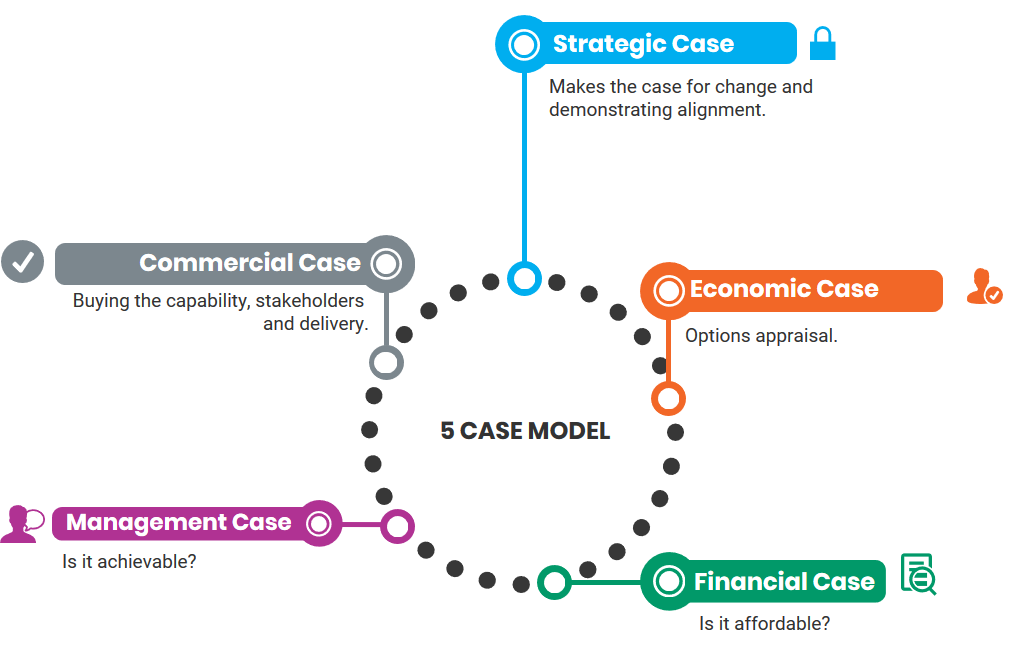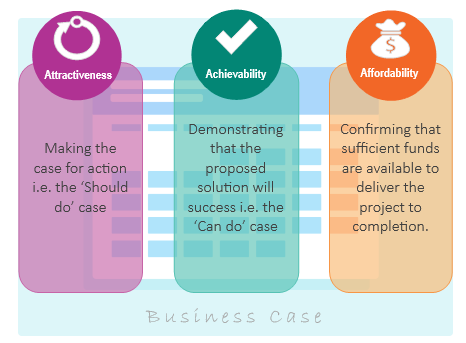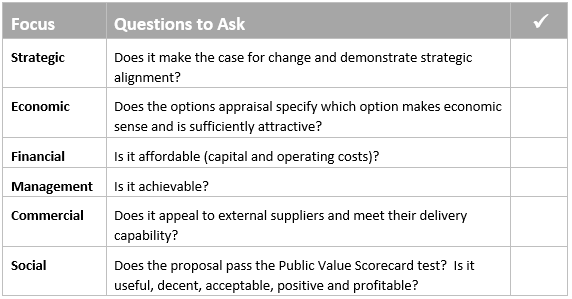Module 3: Informed Decision Making
Topic 3.3: Developing and Evaluating Business Cases
The business model canvas is a very effective tool for developing and evaluating business cases. Please revisit Modules 1 and 2. The business case approach is typically applied when entities want to change the way they are currently achieving outcomes, and/or want to do new things, or do current activities better. We might call this ‘the case for change’. The business case is used to persuade the organisation to realise the opportunity (value realisation) through undertaking the project.
Typically, a business case will fulfil specific purposes:
- to demonstrate the rationale for investing;
- to identify the most cost-effective option;
- to secure funding; help make the case for continued funding; and act as a communication mechanism in helping to persuade stakeholders of the need for investment;
- and finally, to build confidence in delivery (i.e. that the project will be delivered on time, to budget, and that the defined benefits will be realised).
The business case can be used as an iterative planning document to justify our ongoing involvement with the program.
At its heart however, the fundamental purpose of any business case is to address the 3 A’s:
The active nature of Business Case preparation, as in any business planning process, is that it is an ongoing process, not a one-off exercise. Rather, the business case should be a living document that is updated regularly to reflect progress and as new evidence becomes available.
Ultimately, the real test of any business case is whether:
- it succeeds in obtaining funding,
- how well it predicts (and guides)
- the outcome in terms of actual costs incurred, time taken to deliver, and benefits realised, so that it is likely to, confirm that that project has sound basis to justify the investment, and provides a stronger outcomes in terms of public value in relation to alternate investment opportunities.
Required
30 mins
Preparation for Workshop
Overall a business case analysis should be based on the following ‘3As’:
The Business Case – The ‘3 As’
- Return or Attractiveness – Should we do it?
- Risk or Achievability – Can we do it?
- Affordability – Do we have the required funds?
Prepare a short analysis that addresses the ‘3 As’ as they relate to your proposal for your Workplace Project. You will explore the outcomes during the Workshop.
Any business case review will have to address these fundamental questions.
The business case evaluation model in Figure 3.2 provides a more comprehensive development model is enables a robust, reliable and repeatable approach.
Figure 3.2: The 5 Case Business Evaluation Model[1]

Table 3.2 provides the supporting questions for when you apply the 5 Case model. You will note that we have added the additional component, the Social Focus, which encompasses the public value element of the business case.
Required
50 mins
Preparation for the Workshop
20 min
In preparation for the workshop, please find and review the business case evaluation process for your organisation/department.
- Have you applied the process for any of your iniiatives, or witnessed an approach in other sections, or elsewhere?
- How effective is it?
- What could be improved?
Please bring your observations and a copy of the process to the workshop. If you don’t have a current process in your organisation, please find a version.
Application to Workplace Project
30 min
As you are designing your Workplace Project, examine your agency’s organisational chart.
- Clarify the role of your ‘project sponsor’.
- What are the additional associated roles that are necessary for the success of the Project?
- How can you put in place the means to operate within the rules of good governance?
As you continue with your Workplace Project remember to work with your project Opportunity Owner, who may help to inform the overall strategic direction.
- UK Government (2013). Using the 5 Case Business Evaluation Model, Green Book Supplementary Guidance On Delivering Public Value From Spending Proposals. Retrieved from https://www.gov.uk/government/publications/the-green-book-appraisal-and-evaluation-in-central-governent ↵



